Social development
Download as pptx, pdf2 likes6,204 views
Family relationships, parenting styles, and sibling dynamics strongly influence children's social development in early childhood. Authoritative parenting fosters communication while authoritarian parenting may produce fearful children. Siblings provide opportunities to learn social skills through equal and unequal relationships. Preschoolers begin to develop independence and form first friendships, which help them learn skills like handling conflict, sharing, and behaving maturely. However, common fears and aggression during this stage often stem from children's difficulty distinguishing fantasy from reality and their egocentric perspectives. Different parenting techniques balance control and warmth to varying degrees of effect.
1 of 11
Downloaded 154 times
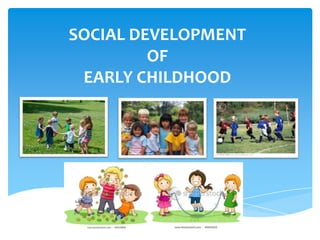
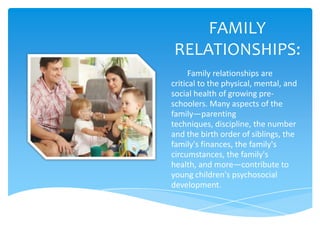
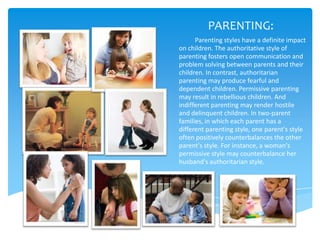
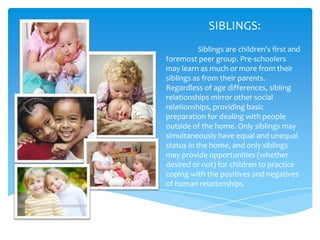
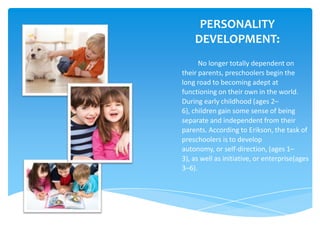
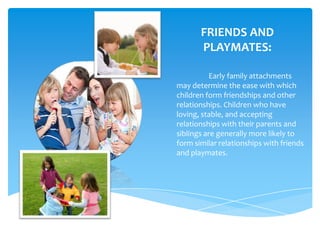
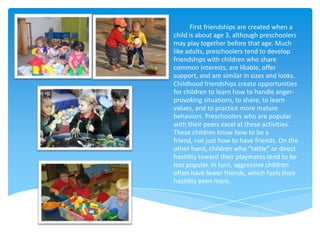

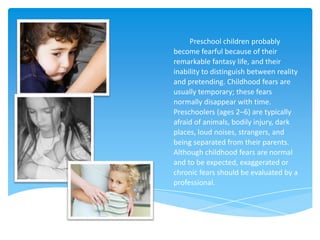
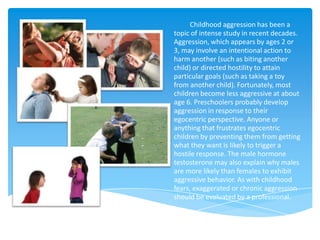

Recommended
SOCIAL-AND-EMOTIONAL-DEVELOPMENT.ppt
SOCIAL-AND-EMOTIONAL-DEVELOPMENT.pptBasicBiology1
Ã˝
This document discusses social and emotional development across different age groups. It outlines key components like emotional awareness, social interaction, and self-regulation that contribute to development. Milestones are provided for infants recognizing parents and expressing emotions, toddlers and preschoolers exploring feelings and independence, school-aged children making friends and reacting to situations, and adolescents expanding social circles and forming identities outside the family.Language development in early childhood period
Language development in early childhood period Independent Professional
Ã˝
Language development is a critical part of child development from ages 2-6 as it allows children to communicate, express themselves, and develop relationships. Children begin developing language from birth through cries and later learn words and sentences. Healthy language development has many benefits and is important for children's cognitive development and ability to socially interact. Parents can support language development through reading, telling stories, singing songs, and engaging in conversations with their children.Social development
Social developmentAmna Abid
Ã˝
The document outlines key aspects of social development in children, defining it as the acquisition of values, knowledge, and skills necessary for effective interpersonal relationships. It discusses the impact of various influences on social development and provides strategies for supporting children, such as modeling appropriate behavior and fostering self-esteem. Additionally, it references Erickson's eight stages of social development and emphasizes the importance of positive adult interactions and learning opportunities in preschool settings.early childhood (2)
early childhood (2)Mary Blaise Mantiza
Ã˝
Young children experience rapid development in their understanding of people and the world. However, their comprehension is limited compared to adults. For this reason, children must learn rules and morality through specific examples and experiences, as their memory and ability to understand abstract concepts is still developing. Several theories discuss children's moral development, focusing on obedience, consequences of actions, and increasing ability to consider reasoning. Effective discipline aims to clearly communicate approved and disapproved behaviors while motivating children to follow standards. Parental relationships and interactions with siblings are especially important for children's self-concept and social-emotional development.Children and Play: Role of Play in Early Childhood
Children and Play: Role of Play in Early ChildhoodIra Parenting
Ã˝
Play is integral to early childhood development, fostering cognitive, physical, and social well-being while teaching essential life skills. Different types of play, such as large-motor, fine-motor, and pretend play, contribute uniquely to children's growth and understanding of themselves and their environment. Play deprivation can lead to negative consequences like depression and diminished self-regulation, highlighting the importance of unstructured, child-directed play.Curriculum and pedagogy in early childhood curriculum
Curriculum and pedagogy in early childhood curriculumjilu123
Ã˝
The document discusses the importance of curriculum and pedagogy in early childhood education, emphasizing their roles in fostering individual development and creating supportive learning environments. It explores various theories of learning and intelligence, the significance of assessment, and the collaboration between teachers, parents, and communities. Additionally, it highlights effective practices and planning methods that address diverse learning needs and promote a holistic approach to child development.Emotional development
Emotional developmentKrishna Priya. K.B.
Ã˝
This document discusses emotional development from infancy through childhood. It defines emotions and outlines their key characteristics. Emotional development refers to the ability to recognize, express, and manage feelings at different stages of life. The document describes common emotional patterns in childhood like fear, anger, and joy. It also outlines Bridge's chart, which shows the approximate ages at which different emotions first appear in children from 3 months to 5 years old. Factors that can influence a child's emotional development include their health, intelligence, family environment, and school atmosphere.Emotional development
Emotional developmentInternational advisers
Ã˝
This document discusses emotional development from infancy through adolescence. It notes that emotional development progresses along with physical and cognitive development from birth. While emotions are difficult to study, researchers have developed theories of emotional development. The document then outlines key milestones in emotional development at different ages, including the emergence of smiling, crying, laughter, and other emotions in infancy, and the development of self-awareness, empathy, and emotional regulation in toddlerhood and childhood. It discusses challenges with emotional expression and understanding among adolescents.Child Development
Child DevelopmentTN DCS
Ã˝
The document outlines various aspects of child development, emphasizing the importance of understanding emotional, social, and psychological growth for foster parents. It details developmental milestones by age, behavior interventions for different age groups, and considerations for LGBTQ youth, along with effects of loss and maltreatment. Additionally, it provides resources for further learning on child development and well-being.4 types of parenting styles
4 types of parenting styles saaifalam
Ã˝
This document discusses different parenting styles including authoritarian, authoritative, permissive, and uninvolved parenting. It outlines benefits and drawbacks of each style. For example, authoritarian parenting can lead to high academic achievement but also anxiety in children. Cultural factors influence parenting approaches as well, such as Asian cultures tending towards authoritarian styles. The document recommends counseling and education to help families adjust parenting to best support children's development.Social development
Social developmentDr. Fatima M.Qassim
Ã˝
The document outlines objectives and content related to social development for different age groups. It discusses:
1. The key objectives of the unit which are to define social development, describe theories of social development, and characteristics and appropriate activities for preschool, kindergarten, and elementary aged children.
2. An overview of social development being closely tied to emotional development. It involves learning social skills through relationships with others.
3. Social development theories discussed include attachment theory, Erikson's psychosocial stages, Vygotsky's zone of proximal development and scaffolding, and Bronfenbrenner's ecological systems theory.
4. Characteristics of social development for preschool, kindergarten, and elementaryRole of Peers in Children Development
Role of Peers in Children DevelopmentYang Mae Tiquio
Ã˝
Peers play an important role in children's development by providing opportunities to learn and practice social skills like cooperation and conflict resolution. They also serve as agents of socialization that help shape children's behaviors and beliefs. While peer pressure can encourage both positive and negative behaviors, peers mainly reinforce values children learn from their family, and children tend to choose friends similar to themselves.Emotional development
Emotional developmentJothish DL
Ã˝
Emotional development progresses through several stages from early childhood to adolescence. In early childhood, emotions are frequent, related to concrete objects, and shift rapidly. By late childhood, emotional expressions become less diffuse and children can express emotions without concrete triggers, though emotions remain contagious. In adolescence, emotions become more complex and abstract, loyalty and compassion expand, and teens develop greater capacity for self-control and consideration of others' feelings.Role of parents
Role of parentsKristinn Örn Kristinsson
Ã˝
The document outlines the roles and responsibilities of parents, teachers, and children in the Suzuki method of music education. Parents are expected to attend lessons, create a positive home environment for practice, and ensure daily listening and practice according to the teacher's instructions. Teachers should understand Suzuki methodology and provide clear assignments and demonstrations. Children should learn to concentrate, follow instructions, and practice daily. Suggestions are provided for making practice more enjoyable, such as using charts and rewards, as well as general recommendations like praising efforts and asking questions respectfully. The results of this method in Japan are described as amazing due to parental obedience and children's respect for teachers.Piaget’S Cognitive Development Theory
Piaget’S Cognitive Development Theorynewkirker
Ã˝
Piaget's theory of cognitive development consists of four stages:
1) Sensorimotor stage (birth to age 2) where children learn through senses and physical interaction.
2) Preoperational stage (ages 2-7) where children develop language and imagination but lack logical reasoning.
3) Concrete operational stage (ages 7-11) where children develop logical thinking skills and understand conservation.
4) Formal operational stage (ages 11 and up) where children develop abstract reasoning and can think hypothetically.
Piaget developed this theory by observing his own children and it focuses on how children construct an understanding of the world through experiences over time.Jean piaget play
Jean piaget playpinar19
Ã˝
Jean Piaget was a cognitive theorist who believed that children learn through active exploration of their environment and imitation of others. He identified four main stages of cognitive development: sensory-motor, pre-operational, concrete operational, and formal operational. Piaget's theory informs early childhood practice by emphasizing the importance of hands-on learning activities that allow children to discover through interactions. This enables practitioners to support development by providing opportunities for real-world experiences through play, exploration of materials, trips, and role play.Importance of play (psed5)
Importance of play (psed5)Bernadette Calugcug
Ã˝
This document discusses the importance of play for child development. It defines play and explains that play is essential for education as children learn through play. It outlines that play enables children to explore their world, develop social and cultural understandings, express thoughts and feelings, and meet and solve problems. The document then discusses how play supports cognitive development, language and literacy development, social development, emotional development, physical development, creativity and imagination. It provides examples for each type of development. Overall, the document emphasizes that play is critically important for children's learning and development across multiple domains.Need and importance of early childhood care & education
Need and importance of early childhood care & educationShowkeen Bilal Ahmad Gul
Ã˝
Early childhood care and education is important because the first six years are a time of rapid growth and development across all domains. By age six, 90% of brain development is complete. The early childhood curriculum recognizes that young children learn best through play, doing, experiencing, and actively participating, rather than direct instruction. It should adopt a play-based approach tailored to the needs, interests, and abilities of each child.Jean Piaget's theory of cognitive development
Jean Piaget's theory of cognitive developmentAnu Shree Varshney
Ã˝
Jean Piaget's theory of cognitive development outlines four stages: sensorimotor, pre-operational, concrete operational, and formal operational, emphasizing that cognitive development is a process influenced by biological maturation and environmental interaction. Key concepts include schemas, assimilation, accommodation, and equilibrium, which describe how children learn and adapt their understanding of the world. Despite its significance, the theory faces criticism for focusing heavily on biological maturation and neglecting cultural influences on development.Social development
Social developmentJohn Edgar Refugio
Ã˝
Social development involves learning social skills that allow children to interact appropriately with others, play social roles, and develop social attitudes. Early social experiences shape whether children grow up to be well-adjusted socially or have difficulties forming relationships. As children progress through childhood and puberty, their social development and relationships with peers become increasingly important influences on their behavior and identity formation. Problems in social development can impact a child's emotional, cognitive and personality development.Montessori.pptx
Montessori.pptxPriyenkaRema
Ã˝
The document provides information on the Montessori method of teaching. It discusses how Maria Montessori developed this educational philosophy based on her observations of how children naturally learn. Some key points covered include:
- Montessori believed children have sensitive periods for learning and should be allowed freedom to choose activities within a prepared environment.
- She developed specialized instructional materials called "didactic apparatus" to aid sensory learning.
- The teacher's role is to observe children and remove obstacles, rather than act as a direct instructor.
- Montessori education aims to holistically support intellectual, physical, emotional and social development through individualized learning.Socio emotional development at Early Childhood
Socio emotional development at Early ChildhoodANVESH CHAUHAN
Ã˝
Presented By: Anvesh Chauhan, discusses socio emotional development in early childhood. Social emotional development includes the ability to experience and manage emotions and establish relationships. It is crucial for skills like communication, self-regulation, empathy and coping. Socially, children learn to interact with others and view themselves as individuals. Emotionally, they expand what emotions they can feel, understand emotions in others, and start regulating their own emotions. Successful social emotional development helps children establish peer relationships and initiative, while challenges can increase anxiety, sadness and behavior issues.Reggio emilia approach ppt
Reggio emilia approach pptLydia Betsy
Ã˝
The Reggio Emilia approach is an innovative early childhood education philosophy that emphasizes the child's potential, collaboration, and the environment's role in learning. Originating in post-World War II Italy, it is characterized by long-term projects, a focus on expressive arts, and strong community involvement, including active participation from parents. Teachers act as partners and researchers, documenting children's learning journeys to foster a reciprocal relationship of learning.Cognitive development
Cognitive developmentPong Smoeurn
Ã˝
Cognitive development is the process of acquiring knowledge and learning to solve problems through growth in thinking, reasoning, memory, language, and other mental processes. It occurs in stages from infancy through adolescence. The first stage from birth to 2 years is the sensory motor period where infants learn through reflexes and senses. The next stage from 2 to 7 years is the preoperational period when children use language and symbols but think egocentrically. The third concrete operations stage from 7 to 12 years involves logical and organized thought and concrete problem solving. Formal operations in adolescence involve abstract thinking and scientific reasoning. Cognitive development is influenced by both biological maturation and social/environmental factors.Vygotsky's Cognitive development
Vygotsky's Cognitive developmentMark Francis Astom
Ã˝
The document discusses Lev Vygotsky's theories on cognitive development, emphasizing the active role of children as knowledge seekers and the interaction between children and their environment. Key concepts include self-regulation, the zone of proximal development, and scaffolding, which highlight the importance of guidance from teachers and peers in the learning process. Vygotsky also posits that language is crucial for the development of thought and consciousness.CHARACTERISTICS OF INFANCY, BABYHOOD, EARLY and LATE CHILDHOOD IN LIFESPAN DE...
CHARACTERISTICS OF INFANCY, BABYHOOD, EARLY and LATE CHILDHOOD IN LIFESPAN DE...Dhriti Raj
Ã˝
The document outlines various stages in the lifespan from the prenatal period to late childhood, detailing characteristics and developmental milestones for each phase. It highlights the distinct traits of infancy, babyhood, early childhood, and late childhood, including cognitive abilities and social behaviors. Additionally, it provides terminology used by parents, educators, and psychologists to describe these stages, reflecting their significance in human development.Social & emotional development
Social & emotional developmentethan1hunt
Ã˝
This document discusses emotional and psychological development from infancy through middle childhood. It covers key theorists like Erik Erikson and describes developmental milestones at each stage, including the development of emotions, social skills, autonomy and self-concept. Cultural influences and gender differences are also addressed. Challenges like aggression, fears, bullying and family crises are explored, emphasizing the importance of supportive caregivers in fostering healthy development.Social and Emotional Development
Social and Emotional DevelopmentPong Smoeurn
Ã˝
The document discusses social and emotional development according to Erikson's psychosocial stages of development. It describes each stage from infancy through late adulthood, the key task or strength developed at each stage, and examples. The stages include trust vs. mistrust in infancy, autonomy vs. shame in toddlerhood, initiative vs. guilt in early childhood, industry vs. inferiority in middle childhood, identity vs. role confusion in adolescence, intimacy vs. isolation in young adulthood, generativity vs. stagnation in middle adulthood, and ego integrity vs. despair in late adulthood. It emphasizes that successful resolution of earlier crises influences success in later stages.Lifespan psychology lecture 3.3
Lifespan psychology lecture 3.3kclancy
Ã˝
This document summarizes key aspects of social and personality development in preschool-aged children. It discusses Erikson's psychosocial stages of autonomy vs shame/doubt and initiative vs guilt. Children develop a sense of self and begin to understand gender, racial, and cultural identities. Friendships and play become increasingly important as children interact more with peers and the world. Parenting styles like authoritarian, authoritative, permissive and uninvolved influence child outcomes.chapter 8Ã˝Emotional and Social Development in Early ChildhoodDur.docx
chapter 8Ã˝Emotional and Social Development in Early ChildhoodDur.docxtiffanyd4
Ã˝
Chapter 8 explores emotional and social development in early childhood, emphasizing children's understanding of themselves and their relationships as they navigate friendship, gender roles, and morality. It discusses Erikson's theory of initiative versus guilt and highlights how preschoolers develop self-concept, self-esteem, and emotional competence through interactions with parents and peers. Cultural influences shape children's storytelling practices and self-perceptions, leading to varying attitudes towards behavior and emotions across different societies.More Related Content
What's hot (20)
Child Development
Child DevelopmentTN DCS
Ã˝
The document outlines various aspects of child development, emphasizing the importance of understanding emotional, social, and psychological growth for foster parents. It details developmental milestones by age, behavior interventions for different age groups, and considerations for LGBTQ youth, along with effects of loss and maltreatment. Additionally, it provides resources for further learning on child development and well-being.4 types of parenting styles
4 types of parenting styles saaifalam
Ã˝
This document discusses different parenting styles including authoritarian, authoritative, permissive, and uninvolved parenting. It outlines benefits and drawbacks of each style. For example, authoritarian parenting can lead to high academic achievement but also anxiety in children. Cultural factors influence parenting approaches as well, such as Asian cultures tending towards authoritarian styles. The document recommends counseling and education to help families adjust parenting to best support children's development.Social development
Social developmentDr. Fatima M.Qassim
Ã˝
The document outlines objectives and content related to social development for different age groups. It discusses:
1. The key objectives of the unit which are to define social development, describe theories of social development, and characteristics and appropriate activities for preschool, kindergarten, and elementary aged children.
2. An overview of social development being closely tied to emotional development. It involves learning social skills through relationships with others.
3. Social development theories discussed include attachment theory, Erikson's psychosocial stages, Vygotsky's zone of proximal development and scaffolding, and Bronfenbrenner's ecological systems theory.
4. Characteristics of social development for preschool, kindergarten, and elementaryRole of Peers in Children Development
Role of Peers in Children DevelopmentYang Mae Tiquio
Ã˝
Peers play an important role in children's development by providing opportunities to learn and practice social skills like cooperation and conflict resolution. They also serve as agents of socialization that help shape children's behaviors and beliefs. While peer pressure can encourage both positive and negative behaviors, peers mainly reinforce values children learn from their family, and children tend to choose friends similar to themselves.Emotional development
Emotional developmentJothish DL
Ã˝
Emotional development progresses through several stages from early childhood to adolescence. In early childhood, emotions are frequent, related to concrete objects, and shift rapidly. By late childhood, emotional expressions become less diffuse and children can express emotions without concrete triggers, though emotions remain contagious. In adolescence, emotions become more complex and abstract, loyalty and compassion expand, and teens develop greater capacity for self-control and consideration of others' feelings.Role of parents
Role of parentsKristinn Örn Kristinsson
Ã˝
The document outlines the roles and responsibilities of parents, teachers, and children in the Suzuki method of music education. Parents are expected to attend lessons, create a positive home environment for practice, and ensure daily listening and practice according to the teacher's instructions. Teachers should understand Suzuki methodology and provide clear assignments and demonstrations. Children should learn to concentrate, follow instructions, and practice daily. Suggestions are provided for making practice more enjoyable, such as using charts and rewards, as well as general recommendations like praising efforts and asking questions respectfully. The results of this method in Japan are described as amazing due to parental obedience and children's respect for teachers.Piaget’S Cognitive Development Theory
Piaget’S Cognitive Development Theorynewkirker
Ã˝
Piaget's theory of cognitive development consists of four stages:
1) Sensorimotor stage (birth to age 2) where children learn through senses and physical interaction.
2) Preoperational stage (ages 2-7) where children develop language and imagination but lack logical reasoning.
3) Concrete operational stage (ages 7-11) where children develop logical thinking skills and understand conservation.
4) Formal operational stage (ages 11 and up) where children develop abstract reasoning and can think hypothetically.
Piaget developed this theory by observing his own children and it focuses on how children construct an understanding of the world through experiences over time.Jean piaget play
Jean piaget playpinar19
Ã˝
Jean Piaget was a cognitive theorist who believed that children learn through active exploration of their environment and imitation of others. He identified four main stages of cognitive development: sensory-motor, pre-operational, concrete operational, and formal operational. Piaget's theory informs early childhood practice by emphasizing the importance of hands-on learning activities that allow children to discover through interactions. This enables practitioners to support development by providing opportunities for real-world experiences through play, exploration of materials, trips, and role play.Importance of play (psed5)
Importance of play (psed5)Bernadette Calugcug
Ã˝
This document discusses the importance of play for child development. It defines play and explains that play is essential for education as children learn through play. It outlines that play enables children to explore their world, develop social and cultural understandings, express thoughts and feelings, and meet and solve problems. The document then discusses how play supports cognitive development, language and literacy development, social development, emotional development, physical development, creativity and imagination. It provides examples for each type of development. Overall, the document emphasizes that play is critically important for children's learning and development across multiple domains.Need and importance of early childhood care & education
Need and importance of early childhood care & educationShowkeen Bilal Ahmad Gul
Ã˝
Early childhood care and education is important because the first six years are a time of rapid growth and development across all domains. By age six, 90% of brain development is complete. The early childhood curriculum recognizes that young children learn best through play, doing, experiencing, and actively participating, rather than direct instruction. It should adopt a play-based approach tailored to the needs, interests, and abilities of each child.Jean Piaget's theory of cognitive development
Jean Piaget's theory of cognitive developmentAnu Shree Varshney
Ã˝
Jean Piaget's theory of cognitive development outlines four stages: sensorimotor, pre-operational, concrete operational, and formal operational, emphasizing that cognitive development is a process influenced by biological maturation and environmental interaction. Key concepts include schemas, assimilation, accommodation, and equilibrium, which describe how children learn and adapt their understanding of the world. Despite its significance, the theory faces criticism for focusing heavily on biological maturation and neglecting cultural influences on development.Social development
Social developmentJohn Edgar Refugio
Ã˝
Social development involves learning social skills that allow children to interact appropriately with others, play social roles, and develop social attitudes. Early social experiences shape whether children grow up to be well-adjusted socially or have difficulties forming relationships. As children progress through childhood and puberty, their social development and relationships with peers become increasingly important influences on their behavior and identity formation. Problems in social development can impact a child's emotional, cognitive and personality development.Montessori.pptx
Montessori.pptxPriyenkaRema
Ã˝
The document provides information on the Montessori method of teaching. It discusses how Maria Montessori developed this educational philosophy based on her observations of how children naturally learn. Some key points covered include:
- Montessori believed children have sensitive periods for learning and should be allowed freedom to choose activities within a prepared environment.
- She developed specialized instructional materials called "didactic apparatus" to aid sensory learning.
- The teacher's role is to observe children and remove obstacles, rather than act as a direct instructor.
- Montessori education aims to holistically support intellectual, physical, emotional and social development through individualized learning.Socio emotional development at Early Childhood
Socio emotional development at Early ChildhoodANVESH CHAUHAN
Ã˝
Presented By: Anvesh Chauhan, discusses socio emotional development in early childhood. Social emotional development includes the ability to experience and manage emotions and establish relationships. It is crucial for skills like communication, self-regulation, empathy and coping. Socially, children learn to interact with others and view themselves as individuals. Emotionally, they expand what emotions they can feel, understand emotions in others, and start regulating their own emotions. Successful social emotional development helps children establish peer relationships and initiative, while challenges can increase anxiety, sadness and behavior issues.Reggio emilia approach ppt
Reggio emilia approach pptLydia Betsy
Ã˝
The Reggio Emilia approach is an innovative early childhood education philosophy that emphasizes the child's potential, collaboration, and the environment's role in learning. Originating in post-World War II Italy, it is characterized by long-term projects, a focus on expressive arts, and strong community involvement, including active participation from parents. Teachers act as partners and researchers, documenting children's learning journeys to foster a reciprocal relationship of learning.Cognitive development
Cognitive developmentPong Smoeurn
Ã˝
Cognitive development is the process of acquiring knowledge and learning to solve problems through growth in thinking, reasoning, memory, language, and other mental processes. It occurs in stages from infancy through adolescence. The first stage from birth to 2 years is the sensory motor period where infants learn through reflexes and senses. The next stage from 2 to 7 years is the preoperational period when children use language and symbols but think egocentrically. The third concrete operations stage from 7 to 12 years involves logical and organized thought and concrete problem solving. Formal operations in adolescence involve abstract thinking and scientific reasoning. Cognitive development is influenced by both biological maturation and social/environmental factors.Vygotsky's Cognitive development
Vygotsky's Cognitive developmentMark Francis Astom
Ã˝
The document discusses Lev Vygotsky's theories on cognitive development, emphasizing the active role of children as knowledge seekers and the interaction between children and their environment. Key concepts include self-regulation, the zone of proximal development, and scaffolding, which highlight the importance of guidance from teachers and peers in the learning process. Vygotsky also posits that language is crucial for the development of thought and consciousness.CHARACTERISTICS OF INFANCY, BABYHOOD, EARLY and LATE CHILDHOOD IN LIFESPAN DE...
CHARACTERISTICS OF INFANCY, BABYHOOD, EARLY and LATE CHILDHOOD IN LIFESPAN DE...Dhriti Raj
Ã˝
The document outlines various stages in the lifespan from the prenatal period to late childhood, detailing characteristics and developmental milestones for each phase. It highlights the distinct traits of infancy, babyhood, early childhood, and late childhood, including cognitive abilities and social behaviors. Additionally, it provides terminology used by parents, educators, and psychologists to describe these stages, reflecting their significance in human development.Social & emotional development
Social & emotional developmentethan1hunt
Ã˝
This document discusses emotional and psychological development from infancy through middle childhood. It covers key theorists like Erik Erikson and describes developmental milestones at each stage, including the development of emotions, social skills, autonomy and self-concept. Cultural influences and gender differences are also addressed. Challenges like aggression, fears, bullying and family crises are explored, emphasizing the importance of supportive caregivers in fostering healthy development.Social and Emotional Development
Social and Emotional DevelopmentPong Smoeurn
Ã˝
The document discusses social and emotional development according to Erikson's psychosocial stages of development. It describes each stage from infancy through late adulthood, the key task or strength developed at each stage, and examples. The stages include trust vs. mistrust in infancy, autonomy vs. shame in toddlerhood, initiative vs. guilt in early childhood, industry vs. inferiority in middle childhood, identity vs. role confusion in adolescence, intimacy vs. isolation in young adulthood, generativity vs. stagnation in middle adulthood, and ego integrity vs. despair in late adulthood. It emphasizes that successful resolution of earlier crises influences success in later stages.Similar to Social development (20)
Lifespan psychology lecture 3.3
Lifespan psychology lecture 3.3kclancy
Ã˝
This document summarizes key aspects of social and personality development in preschool-aged children. It discusses Erikson's psychosocial stages of autonomy vs shame/doubt and initiative vs guilt. Children develop a sense of self and begin to understand gender, racial, and cultural identities. Friendships and play become increasingly important as children interact more with peers and the world. Parenting styles like authoritarian, authoritative, permissive and uninvolved influence child outcomes.chapter 8Ã˝Emotional and Social Development in Early ChildhoodDur.docx
chapter 8Ã˝Emotional and Social Development in Early ChildhoodDur.docxtiffanyd4
Ã˝
Chapter 8 explores emotional and social development in early childhood, emphasizing children's understanding of themselves and their relationships as they navigate friendship, gender roles, and morality. It discusses Erikson's theory of initiative versus guilt and highlights how preschoolers develop self-concept, self-esteem, and emotional competence through interactions with parents and peers. Cultural influences shape children's storytelling practices and self-perceptions, leading to varying attitudes towards behavior and emotions across different societies.14-Emotional-Development.ppt
14-Emotional-Development.pptMjManuel5
Ã˝
The document discusses human emotional development in four areas: social, emotional, physical, and intellectual. It covers various emotions like anger, happiness, empathy, and jealousy. It also discusses emotional challenges like sadness, fear, stress, and the struggle between dependence and independence. The development of imagination, creativity, conformity, values and goal-setting are also examined in relation to a child's emotional growth.14-Emotional-Development.ppt
14-Emotional-Development.pptSinergiJiwa
Ã˝
This document discusses human development across four areas - social, emotional, physical, and intellectual. It focuses on emotional development, describing various emotions like anger, happiness, jealousy, sadness, and fear that children experience at different developmental stages. It also discusses how children develop independence from parents as they grow. The areas of development are interconnected, so when one is affected it may influence others.Emotional-Development.ppt
Emotional-Development.pptMuhammadNaqiuddinNaq
Ã˝
This document discusses human development across four areas - social, emotional, physical, and intellectual. It focuses on emotional development and covers topics like feelings, empathy, happiness, anger, jealousy, sadness/depression, fear, and the struggle between dependence and independence. Imagination, creativity, conformity, and childhood myths are also examined in the context of a child's emotional growth. The overall message is that a child's emotional development involves learning to understand and regulate their feelings in socially appropriate ways.14 Emotional Development.ppt
14 Emotional Development.pptPuneetMathur39
Ã˝
The document discusses human emotional development in four areas: social, emotional, physical, and intellectual. It covers various emotions like anger, happiness, empathy, and jealousy. It also discusses emotional challenges like sadness, fear, stress, and the struggle between dependence and independence. The development of imagination, creativity, conformity, values and goal-setting are also examined in relation to a child's emotional growth.Attachment and emotion.ppt
Attachment and emotion.pptAnneMharizBicaldo
Ã˝
This document discusses emotional development in children in 3 paragraphs or less:
Children develop emotionally in several areas including recognizing and expressing feelings, developing empathy, learning to manage anger and sadness, and developing fears and coping strategies. Key emotional milestones include recognizing basic emotions in the first year, developing jealousy between ages 1-2, and experiencing fears of strangers and loud noises as infants. Managing emotions involves learning to express feelings in healthy ways and control impulses. Developing emotional intelligence allows children to build relationships and handle challenges.Early childhood pp
Early childhood pplibra1984
Ã˝
The document discusses physical, cognitive, motor, and social development in early childhood from ages 3 to 6. Key aspects include brain development continuing through myelination; average growth rates and nutrition needs; expanding language skills like vocabulary and sentence complexity; improving gross and fine motor coordination; developing peer relationships and gender identity; the importance of play; and issues like poverty, divorce, discipline styles, and violence that can influence this stage. Protective factors are also examined like social support, positive parenting, and self-esteem.Chapter8 PP HDEV MJC
Chapter8 PP HDEV MJCemmanuelviking
Ã˝
Early childhood is a time of significant social, emotional, and cognitive development. Children develop social skills through play and interactions with parents, siblings, and peers. Warm parenting that includes affection and reasoning is linked to better social-emotional outcomes in children. Gender roles and differences in behavior begin to emerge in early childhood as children learn from social models and develop gender identity and constancy. Theories suggest both biological factors like brain organization and social influences contribute to the development of gender differences.Early childhood
Early childhoodDr. Purshottam Jaspa
Ã˝
- Childhood spans from approximately ages 2-13 for girls and 2-14 for boys, encompassing both early and late childhood.
- Early childhood is ages 2-6 and involves remarkable physical, cognitive, social, and emotional development. Late childhood is ages 6 until sexual maturity and brings increased independence and importance of peer groups.
- Both periods see development of skills, speech, emotions, social behaviors, and conceptual understanding, with late childhood bringing improved control and group orientation.
- Hazards during childhood include physical illnesses or accidents as well as social isolation, inconsistent parenting, and peer rejection, which can negatively impact adjustment.Berger Ls 7e Ch 10
Berger Ls 7e Ch 10Los Angeles Southwest
Ã˝
1. The document discusses emotional development in children ages 2-6, focusing on learning to regulate emotions and developing self-esteem.
2. It also examines the role of parents in children's emotional development and differences in parenting styles.
3. Additionally, the document covers gender development in young children and various theories about the origins and learning of gender differences.Berger Ls 7e Ch 10
Berger Ls 7e Ch 10mara bentley
Ã˝
The document discusses emotional development in children ages 2 to 6. Key points include:
- Learning to regulate emotions is a major developmental task, and pride in accomplishments supports self-esteem.
- Parenting style, culture, and early experiences influence a child's emotional development and ability to develop empathy or aggression.
- Gender roles are formed through a complex interplay of biological differences and environmental socialization.Family Relationships.pp t
Family Relationships.pp tGeoffreyOkelo1
Ã˝
The document discusses the complex interactions within family relationships, highlighting how parents and children influence each other through direct and indirect socialization. It elaborates on various parenting styles, their effects on children's development, and the challenges posed by divorce and single-parent families, emphasizing the importance of supportive parenting for children's well-being. Additionally, it outlines the significance of play in social development, showcasing different types of play and their contributions to children's emotional and social growth.Child development, chapter 10, Caprice Paduano
Child development, chapter 10, Caprice PaduanoCaprice Paduano
Ã˝
This chapter discusses social development in preschool-aged children. It covers how children develop their self-concept, gender identity, and sense of morality during this stage. Children learn to engage in social relationships with peers and begin to understand other people's perspectives. The chapter also examines parenting styles, play, aggression, and cultural differences in child-rearing practices during the preschool years.Child development, chapter 10, paduano
Child development, chapter 10, paduanoCaprice Paduano
Ã˝
This chapter discusses social development in preschool-aged children. It covers how children develop their self-concept, gender identity, and sense of morality during this period. Children learn to engage in social relationships with peers and begin to understand other people's perspectives. The chapter also examines parenting styles, play behaviors, aggression, and cultural differences in child-rearing practices during the preschool years.Emotional, Social and Intellect Development.pptx
Emotional, Social and Intellect Development.pptxMaryamAfzal41
Ã˝
Emotional, social, and intellectual development occur across the lifespan from infancy through adulthood. Emotional development involves learning to understand and regulate emotions. Socially, children progress from bonding with caregivers to engaging with peers. Cognitively, development involves advancing from sensory exploration to abstract thought. Parents can support growth by responding sensitively, fostering independence, and modeling healthy social and emotional skills. Development occurs through interactive stages characterized by specific skills and challenges.Chapter 10
Chapter 10Traveon Brassfield
Ã˝
The document discusses emotional development in children ages 2 to 6. It covers key topics like emotional regulation, self-esteem, guilt and shame, motivation, empathy, aggression, the influence of parenting styles and culture on development, and the formation of gender identity. Parental warmth, discipline strategies, and limiting media exposure are important for healthy psychosocial growth during these early years.family relationship
family relationshipupvita pandey
Ã˝
This document discusses families and relationships. It states that families form interacting systems where parents and children influence each other bidirectionally. Parents socialize children through direct instruction, modeling, feedback, reinforcement, and punishment. Effective parenting involves warmth and appropriate control. Children are also influenced by parenting styles like authoritative, authoritarian, indulgent, and uninvolved. Divorce can negatively impact children's development, though effects depend on age and parental cooperation. Play benefits children's social and emotional development.Intelligence consists of the ability to solve problems and to adapt and learn...
Intelligence consists of the ability to solve problems and to adapt and learn...Mark Baugh
Ã˝
Intelligence consists of the ability to solve problems and adapt to experiences. Sir Francis Galton established mental testing, Alfred Binet developed the first intelligence test and the concept of mental age, and William Stern developed the IQ. Intelligence tests should be valid, reliable, and standardized. Early tests favored white urban individuals. Tests can determine individual differences when used judiciously. Factor analysis identifies correlated factors among test items or measures. Gardner and Sternberg proposed multiple types of intelligence beyond academic abilities. Emotional intelligence involves self and social awareness and management. Approaches to intelligence have broadened its definition and motivated new educational programs. Children's scores and specific abilities often fluctuate. Infant tasks predict later intelligence. Mental retardation involves low IQ and difficultyEDU 145 Ch 10
EDU 145 Ch 10Claudia Anderson
Ã˝
1. The document discusses psychosocial development in early childhood, focusing on emotional development, play, moral development, and the development of gender identity.
2. Key topics include learning emotional regulation between ages 2-6, the importance of play, parenting styles, and how children come to understand themselves as boys or girls.
3. Theories of development discussed include psychoanalytic theory, behaviorism, cognitive theory, and sociocultural theory as they relate to gender development.Social development
- 1. SOCIAL DEVELOPMENT OF EARLY CHILDHOOD
- 2. FAMILY RELATIONSHIPS: Family relationships are critical to the physical, mental, and social health of growing pre- schoolers. Many aspects of the family—parenting techniques, discipline, the number and the birth order of siblings, the family's finances, the family's circumstances, the family's health, and more—contribute to young children's psychosocial development.
- 3. PARENTING: Parenting styles have a definite impact on children. The authoritative style of parenting fosters open communication and problem solving between parents and their children. In contrast, authoritarian parenting may produce fearful and dependent children. Permissive parenting may result in rebellious children. And indifferent parenting may render hostile and delinquent children. In two-parent families, in which each parent has a different parenting style, one parent's style often positively counterbalances the other parent's style. For instance, a woman's permissive style may counterbalance her husband's authoritarian style.
- 4. SIBLINGS: Siblings are children's first and foremost peer group. Pre-schoolers may learn as much or more from their siblings as from their parents. Regardless of age differences, sibling relationships mirror other social relationships, providing basic preparation for dealing with people outside of the home. Only siblings may simultaneously have equal and unequal status in the home, and only siblings may provide opportunities (whether desired or not) for children to practice coping with the positives and negatives of human relationships.
- 5. PERSONALITY DEVELOPMENT: No longer totally dependent on their parents, preschoolers begin the long road to becoming adept at functioning on their own in the world. During early childhood (ages 2– 6), children gain some sense of being separate and independent from their parents. According to Erikson, the task of preschoolers is to develop autonomy, or self-direction, (ages 1– 3), as well as initiative, or enterprise(ages 3–6).
- 6. FRIENDS AND PLAYMATES: Early family attachments may determine the ease with which children form friendships and other relationships. Children who have loving, stable, and accepting relationships with their parents and siblings are generally more likely to form similar relationships with friends and playmates.
- 7. First friendships are created when a child is about age 3, although preschoolers may play together before that age. Much like adults, preschoolers tend to develop friendships with children who share common interests, are likable, offer support, and are similar in sizes and looks. Childhood friendships create opportunities for children to learn how to handle anger- provoking situations, to share, to learn values, and to practice more mature behaviors. Preschoolers who are popular with their peers excel at these activities. These children know how to be a friend, not just how to have friends. On the other hand, children who “tattle” or direct hostility toward their playmates tend to be less popular. In turn, aggressive children often have fewer friends, which fuels their hostility even more.
- 8. FEAR AND AGGRESSION: Two negative emotions experienced during early childhood are fear (anxiety) andaggression (hostility).
- 9. Preschool children probably become fearful because of their remarkable fantasy life, and their inability to distinguish between reality and pretending. Childhood fears are usually temporary; these fears normally disappear with time. Preschoolers (ages 2–6) are typically afraid of animals, bodily injury, dark places, loud noises, strangers, and being separated from their parents. Although childhood fears are normal and to be expected, exaggerated or chronic fears should be evaluated by a professional.
- 10. Childhood aggression has been a topic of intense study in recent decades. Aggression, which appears by ages 2 or 3, may involve an intentional action to harm another (such as biting another child) or directed hostility to attain particular goals (such as taking a toy from another child). Fortunately, most children become less aggressive at about age 6. Preschoolers probably develop aggression in response to their egocentric perspective. Anyone or anything that frustrates egocentric children by preventing them from getting what they want is likely to trigger a hostile response. The male hormone testosterone may also explain why males are more likely than females to exhibit aggressive behavior. As with childhood fears, exaggerated or chronic aggression should be evaluated by a professional.
- 11. Additonal sa parenting Different parents employ different parenting techniques. The techniques parents choose depend on cultural and community standards, the situation, and the children's behavior at the time. The techniques that parents use to relate to their children are characterized by degrees of parental control and parental warmth.Parental control involves the degree to which parents are restrictive in their use of parenting techniques, and parental warmth involves the degree to which they are loving, affectionate, and approving in their use of these techniques. Authoritarian parents demonstrate high parental control and low parental warmth when parenting. Permissive parents demonstrate high parental warmth and low parental control when parenting. Indifferent parents demonstrate low parental control and low warmth. Authoritative parents, however, demonstrate appropriate levels of both parental control and warmth.